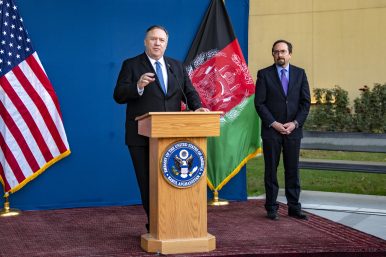By Catherine Putz
En route to India, U.S. Secretary of State Mike Pompeo stopped in Afghanistan for a quick defense of the Trump administration’s efforts at establishing peace and to take further jabs at Iran.
One headline comment from his brief visit to Kabul was in response to a Tolo News reporter’s question as to whether a peace deal can be reached before the presidential elections now set for September.
“I hope we have a peace deal before September 1st. That’s certainly our mission set,” Pompeo said.
Pompeo, accompanied by Zalmay Khalilzad, the U.S. envoy spearheading efforts to make peace in Afghanistan, met with Afghan President Ashraf Ghani and Chief Executive Abdullah Abdullah.
In his remarks to the press, Pompeo talked up the United States’ efforts to bring about peace in Afghanistan. “For the last nine months, the United States has facilitated a peace process intent on protecting our national interests while convening all the parties for inter-Afghan negotiations that will allow Afghans to fashion a political settlement and determine the future for their country.”
Khalilzad has held a steady stream of meetings — bouncing between Qatar, Kabul and Washington — with Afghan government officials and Taliban representatives. He has not, however, managed to get them in a room together.
The Taliban, while clearly open to talking withdrawal with the Americans, remains adamant in its labeling of the Ghani-led government as a Western puppet.
The next round of U.S.-Taliban talks are set to begin in Qatar on June 29.
In January, the United States and the Taliban reached an “agreement in principle” that, as Pompeo put it this week, “any comprehensive peace agreement must address four interconnected issues: counterterrorism, foreign troop presence, inter-Afghan dialogue leading to inter-Afghan negotiations, as well as a permanent ceasefire.”
Pompeo said “we have made real progress” on the terrorism point, and are “nearly ready to conclude a draft text outlining the Taliban’s commitments to join fellow Afghans in ensuring that Afghan soil never again becomes a safe haven for terrorists.”
The Taliban has asserted that the United States has a timeline for withdrawing its troops; Pompeo denied it. “This should come as no surprise, but sometimes our adversaries announce things that just aren’t true.”
That comment may echo inconveniently given that a key aspect of the counterterrorism bullet point is a Taliban pledge to not let Afghan soil be used by terrorist groups.
On the other matters, Pompeo reiterated that “all sides agree” that the first two must be achieved first. He cast this as the United States not negotiating on the Afghan government’s behalf. “Rather, we’re working to bring Afghans together at the negotiating table to decide the future of their own country collectively.”
Meanwhile, Afghanistan is lurching toward a much-delayed presidential election. Ghani’s five-year mandate — to say nothing of the U.S.-brokered National Unity Government system established between Ghani and Abdullah — technically expired in May, though a Supreme Court ruling will let Ghani remain president until the election. Ghani is running for a second term and Abdullah is running against him, again, for the presidency. Ghani’s opponents wanted an interim government to steer the country until the next election, which was originally scheduled for April, delayed to July, and then further to September.
Essentially, the United States is working toward bringing the Taliban — which has continued attacks throughout the negotiating process, including what it termed an ambush that claimed the lives of two U.S. soldiers this week — into a political structure that is crumbling as it stumbles toward an election.
The United States’ main interests are clear: Avoiding a repeat of 9/11 by drawing out a commitment from the Taliban to not let Afghan territory be used as it was by al-Qaeda and withdrawing American troops from the country. But if the latter happens, the question has to be asked why the United States — which via Pompeo’s mouth this week said “our adversaries announce things that just aren’t true” — would believe such a commitment to be lasting once the troops leave. It’s a pernicious cycle, especially as the war drags into its 18th year and it’s clear the United States cannot achieve a military victory. But walking away increasingly takes on the tone of abandoning the Afghan government with every meeting that doesn’t include Kabul.
Talking with the Taliban remains critical and far better than silence between the sides, but Pompeo’s optimism seems ungrounded,
Meanwhile, as always, Washington’s attention is drawn elsewhere.
Pompeo alluded to this in his remarks: “With so much going on in the world right now, sometimes it’s easy to forget about America’s commitment here in Afghanistan, but the world should know that the Trump administration hasn’t forgotten and the American people have not forgotten.”

No comments:
Post a Comment